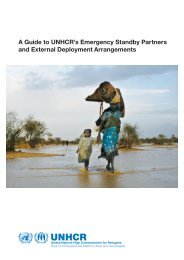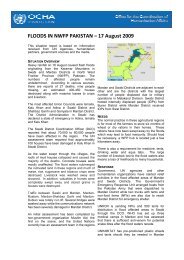Women, Girls, Boys and men - HumanitarianInfo.org
Women, Girls, Boys and men - HumanitarianInfo.org
Women, Girls, Boys and men - HumanitarianInfo.org
Create successful ePaper yourself
Turn your PDF publications into a flip-book with our unique Google optimized e-Paper software.
LEGAL FRAMEWORK<br />
I A s c g e n D e r h A n D b o o k<br />
ing members of armed forces, comply with their human<br />
rights obligations, with humanitarian staff alerting human<br />
rights staff when there is a suspicion or evidence of<br />
abuse. Information should be referred through the appropriate<br />
channel to the appropriate staff or <strong>org</strong>anization for<br />
follow-up, bearing in mind that the protection of victims<br />
<strong>and</strong> witnesses, including their identities <strong>and</strong> information<br />
that may compromise their security, should be of primary<br />
concern. Humanitarian actors could facilitate access to<br />
crisis areas <strong>and</strong> populations for human rights officers <strong>and</strong><br />
other staff with protection duties. They could also work<br />
to influence the responsible authorities to ensure respect<br />
for the norms, rights <strong>and</strong> duties set out in international<br />
law, alerting political bodies like the Security Council to<br />
protection problems.<br />
Practices within a community, including cultural, traditional<br />
or religious practices, may violate the rights of<br />
wo<strong>men</strong> <strong>and</strong> girls <strong>and</strong> serve as obstacles to achieving<br />
gender equality. In such situations, it bears noting that<br />
international law is negotiated by States which then voluntarily<br />
agree to be bound by it. The international human<br />
rights treaties, including the International Covenant on<br />
Civil <strong>and</strong> Political Rights (ICCPR), the International Covenant<br />
on Economic, Social <strong>and</strong> Cultural Rights (ICESCR), the<br />
Convention on the Elimination of All Forms of Discrimination<br />
against <strong>Wo<strong>men</strong></strong> (CEDAW) <strong>and</strong> the Convention on the<br />
Rights of the Child (CRC), contain minimum acceptable<br />
st<strong>and</strong>ards. While culture <strong>and</strong> social factors should be considered,<br />
humanitarian actors should at all times respect<br />
<strong>and</strong> promote respect for these st<strong>and</strong>ards <strong>and</strong> work with<br />
all parties, including States <strong>and</strong> the communities concerned,<br />
to ensure that the rights of wo<strong>men</strong> <strong>and</strong> girls are<br />
respected, promoted <strong>and</strong> fulfilled. Humanitarian workers<br />
should never condone, consent or contribute to violations<br />
of human rights.<br />
It is crucial, however, that human rights <strong>and</strong> humanitarian<br />
actors work closely with individual community members<br />
<strong>and</strong> different groups in the community to identify <strong>and</strong><br />
address the protection problems faced by wo<strong>men</strong>, girls,<br />
boys <strong>and</strong> <strong>men</strong>. Otherwise there is a risk of a backlash,<br />
which may present additional protection problems.<br />
The nternat onal legal framework<br />
The international legal framework for protection is primarily<br />
composed of three interrelated <strong>and</strong> mutually reinforcing<br />
bodies of treaty law: international human rights,<br />
humanitarian <strong>and</strong> refugee law. Customary international<br />
law, which is derived from a consistent practice by States<br />
rather than a legal text, also contains a number of important<br />
rights <strong>and</strong>, for instance, prohibits acts such as arbitrary<br />
detention, extra-judicial killings, slavery <strong>and</strong> torture.<br />
T H e I n T e R n AT I o n A l l e G A l F R A m e w o R k F o R P R o T e C T I o n<br />
InTErnATIonAl HumAn<br />
rIGHTS lAW<br />
What are human r ghts?<br />
Article 1 of the Universal Declaration of Human Rights<br />
(UDHR) states: “All human beings are born free <strong>and</strong> equal<br />
in dignity <strong>and</strong> rights.” Human rights — such as the right<br />
to life — are inherent <strong>and</strong> inalienable in human beings<br />
simply by the fact of their being human. Individuals <strong>and</strong><br />
groups cannot voluntarily give up their human rights, nor<br />
can others take them away.<br />
Human rights enjoy legal protection through codification<br />
in seven core international treaties. Some of the treaties<br />
are supple<strong>men</strong>ted by optional protocols dealing with<br />
specific issues. Many regional treaties also protect <strong>and</strong><br />
promote human rights. Taken together, these instru<strong>men</strong>ts<br />
<strong>and</strong> national law provide safeguards against actions <strong>and</strong><br />
omissions that interfere with human dignity, funda<strong>men</strong>tal<br />
freedoms <strong>and</strong> entitle<strong>men</strong>ts.<br />
States establish their consent to be legally bound by a<br />
treaty, <strong>and</strong> to imple<strong>men</strong>t its provisions nationally, through<br />
the act of ratification or accession. For example, 156 States<br />
have so far ratified the ICCPR, thus undertaking to guarantee<br />
to all individuals within their territory <strong>and</strong> subject<br />
to their jurisdiction (even if not situated within the territory<br />
of the State) the rights in the Covenant. The ICCPR<br />
prohibits distinction on the basis of sex, <strong>and</strong> specifically<br />
commits States to ensuring the equal right of wo<strong>men</strong> <strong>and</strong><br />
<strong>men</strong> to the enjoy<strong>men</strong>t of all rights enshrined in the Covenant,<br />
including:<br />
• the right to life;<br />
• freedom from torture or cruel, inhuman or degrading<br />
treat<strong>men</strong>t or punish<strong>men</strong>t;<br />
• freedom from slavery, servitude <strong>and</strong> forced or compulsory<br />
labour;<br />
• the right to liberty <strong>and</strong> security of person <strong>and</strong> freedom<br />
from arbitrary arrest or detention;<br />
• the right of detained individuals to be treated with humanity<br />
<strong>and</strong> dignity;<br />
• equality before the law <strong>and</strong> equal protection of the law;<br />
• the right to a fair trial; <strong>and</strong><br />
• freedom of religion, expression, assembly <strong>and</strong> association.<br />
The ICESCR protects the following rights, which correspond<br />
to sectors of humanitarian assistance:<br />
• the right to education;











